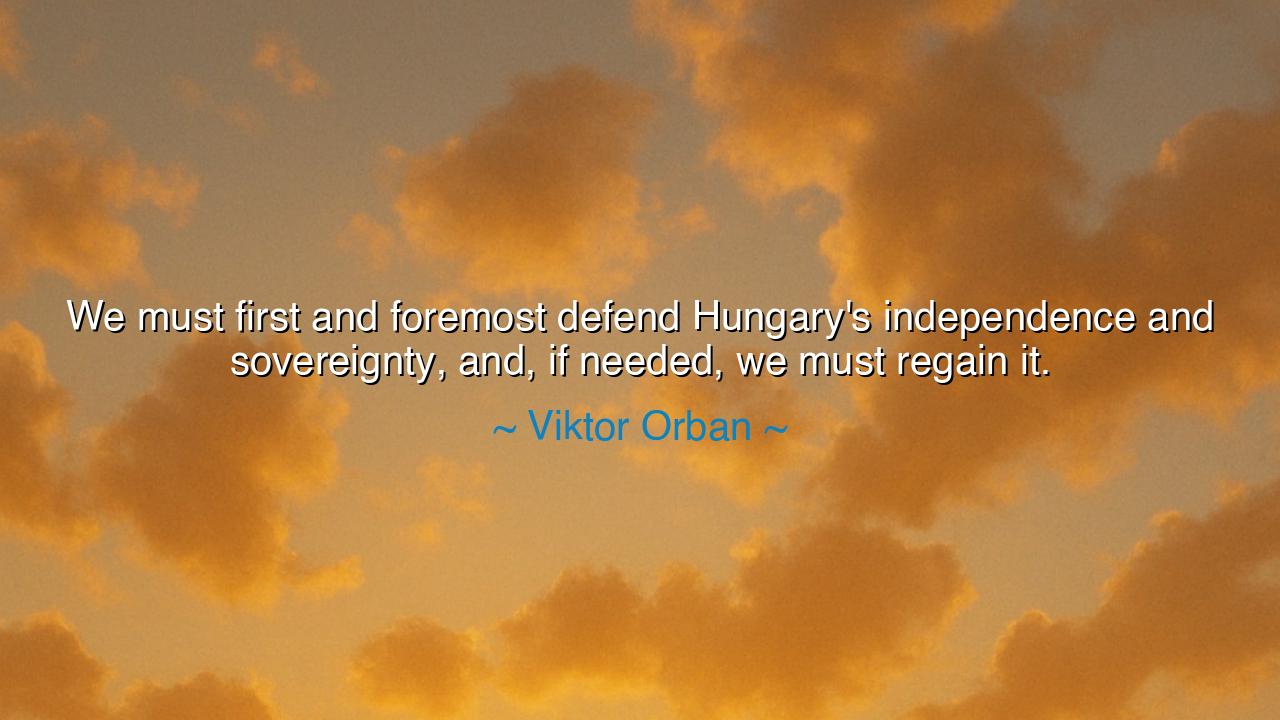
We must first and foremost defend Hungary's independence and
We must first and foremost defend Hungary's independence and sovereignty, and, if needed, we must regain it.






“We must first and foremost defend Hungary’s independence and sovereignty, and, if needed, we must regain it.” Thus spoke Viktor Orbán, a son of the Magyar soil, whose words echo not only across the fields of his homeland but through the corridors of all human struggle. His words are not merely about borders and governments — they are a call to the eternal spirit of self-determination, the sacred fire that burns in every people and every soul that refuses to bow to the will of another. For independence is not a gift bestowed by others; it is a flame that must be guarded, lest the winds of complacency or conquest snuff it out.
There was a time, not long past, when Hungary stood chained beneath the weight of empires — when her banners were torn and her tongue was silenced by others who claimed to rule for her good. The year 1956 stands as a testament to this truth. Then, the Hungarian people rose as one against the vast might of the Soviet Union. Students, workers, mothers, and old soldiers took to the streets of Budapest, crying for freedom, for sovereignty, for the right to breathe and dream as Hungarians once more. For thirteen brief and shining days, liberty walked their streets. But the tanks came, and fire rained upon their courage. Yet though they fell, their defiance did not die — it smoldered beneath the ashes until freedom came again decades later.
Such is the nature of sovereignty — it can be taken by force, yet never truly surrendered unless a people forget who they are. Orbán’s words call upon that memory, upon the ancient pulse that has carried Hungary through the centuries, from the founding of the Magyars to the storms of empire and war. For a nation, like a man, must guard its soul. When the will to be free fades, when one’s destiny is handed over to strangers, the body may survive — but the spirit withers. Thus, to defend independence is not merely to build armies or close borders; it is to nurture pride, culture, and the right to decide one’s fate.
And yet, his words bear another warning — the second blade of truth hidden within them: “If needed, we must regain it.” To regain something is to admit that it can be lost. History shows how swiftly sovereignty can slip away — not always through conquest, but through complacency, through the quiet yielding of power to unseen hands. In every age, there are those who trade freedom for comfort, who sell their birthright for convenience. The ancients knew this peril well: the Greeks who grew weary of vigilance, the Romans who surrendered their republic for the ease of empire. So too must every generation remember — what is not defended will be taken, and what is not cherished will decay.
Consider the story of Poland, whose borders were erased from maps for more than a century. Its people lived under foreign rule — Russian, Prussian, Austrian — yet they kept their faith, their language, their songs. When their flag finally rose again, it was not by conquest, but by endurance. They regained their sovereignty because they never let it die within their hearts. So too does Orbán’s call remind us: a nation’s freedom begins not with its armies, but with its memory — and its will to stand unbroken, even in the darkest hour.
The meaning of this quote, then, is both national and universal. To defend sovereignty is not only the duty of governments; it is the duty of every soul who values truth, heritage, and dignity. It is the call of the parent who teaches their child their mother tongue, the worker who labors with integrity, the thinker who refuses to let others dictate his thoughts. Independence is not merely political — it is spiritual. It is the refusal to let one’s destiny be written by another’s hand.
And what lesson, then, shall we carry from these words? That freedom, once gained, must be guarded with wisdom and love. That we must question softly but stand firmly. That we must never trade the soul of a nation — or of a person — for the passing comfort of peace without honor. For just as a man who ceases to think for himself becomes a servant, a nation that ceases to rule itself becomes a shadow.
So let this teaching be etched into our hearts: cherish your independence, protect your sovereignty, and if ever they are lost, have the courage to regain them. In your own life, defend your mind from manipulation, your values from decay, your purpose from surrender. For only the vigilant remain free — and only the free can build a world worthy of their children.






AAdministratorAdministrator
Welcome, honored guests. Please leave a comment, we will respond soon